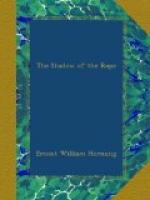Langholm went north next morning by the ten o’clock express from King’s Cross. He had been but four nights in town, and not four days, yet to Langholm they might have been weeks, for he had never felt so much and slept so little in all his life. He had also done a good deal; but it is the moments of keen sensation that make up the really crowded hours, and Langholm was to run the gamut of his emotions before this memorable week was out. In psychological experience it was to be, for him, a little lifetime in itself; indeed, the week seemed that already, while it was still young, and comparatively poor in incident and surprise.
He had bought magazines and the literary papers for his journey, but he could concentrate his mind on nothing, and only the exigencies of railway travelling kept him off his legs. Luckily for Langholm, however, sleep came to him when least expected, in his cool corner of the corridor train, and he only awoke in time for luncheon before the change at York. His tired brain was vastly refreshed, but so far he could not concentrate it, even on the events of these eventful days. He was still in the thick of them. A sense of proportion was as yet impossible, and a consecutive review the most difficult of intellectual feats. Langholm was too excited, and the situation too identical with suspense, for a clear sight of all its bearings and potentialities; and then there was the stern self-discipline, the determined bridling of the imagination, in which he had not yet relaxed. Once in the night, however, in the hopeless hours between darkness and broad day, he had seen clearly for a while, and there and then pinned his vision down to paper. It concerned only one aspect of the case, but this was how Langholm found that he had stated it, on taking out his pocket-book during the final stages of his journey—
PROVISIONAL CASE AGAINST —— —— ——
1. Was in Sloane Street on the night of the
murder, at an hotel
about a mile from the house
in which the murder was committed.
This can be proved.
2. Left hotel shortly after arrival towards
midnight, believed to
have returned between two
and three, and would thus have been
absent at very time at which
crime was committed according to
medical evidence adduced at
trial. But exact duration of absence
from hotel can he proved.
3. Knew M. in Australia, but was in England
unknown to M. till two
mornings before murder, when
M. wrote letter on receipt of which
—— ——
—— came up to town (arriving near
scene of murder as
above stated, about time of
commission). All this morally certain
and probably capable of legal
proof.
4. “So then I asked why a man he hadn’t
seen for so long should pay
his debts; but M. only laughed
and swore, and said he’d make him.”
C. could be subpoenaed to
confirm if not to amplify this statement
to me, with others to effect
that it was for money M. admitted
having written to “a
millionaire.”




